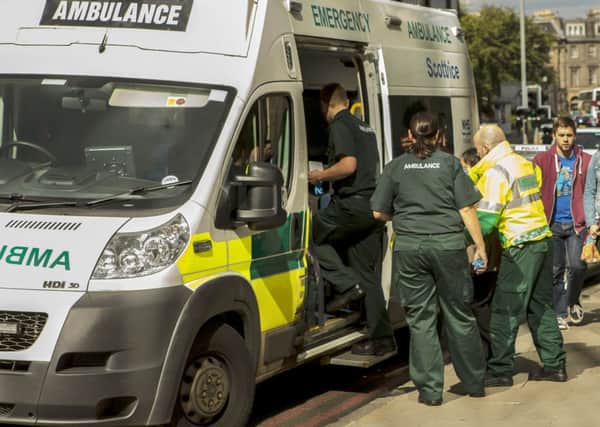Ambulance staff suffer attacks once a day


Incidents have soared by almost half with workers being subjected to 321 assaults in 2013, up 7 per cent on the 301 attacks the previous year and 47 per cent higher than the 219 incidents five years ago.
Physical and verbal attacks in 2013 included six “aggravated assaults with intent to kill” using a firearm or knife.
Advertisement
Hide AdAdvertisement
Hide AdIn more than 100 incidents, ambulance staff reported being “punched, kicked or spat at” by members of the public.
Workers were threatened with a “knife or bottle” 13 times while caring for patients.
As well as physical violence, ambulance workers were subjected to 136 verbal insults, with four reported incidents of “threatening to kill” a crew member or “torch a property”.
Abused staff were also hit by doors “with intent to harm” four times and suffered 16 “clinical assaults” – including being “struck by fitting patient”.
The figures were released under Freedom of Information.
David Forbes, regional health officer of public service union Unison, which represents many ambulance staff, said: “We consider any assault on crews doing their best to provide an emergency service completely unacceptable.
CONNECT WITH THE SCOTSMAN
• Subscribe to our daily newsletter (requires registration) and get the latest news, sport and business headlines delivered to your inbox every morning
“We don’t know why there should be an increase, but stretched resources will have a knock-on effect in waiting times for patients. No doubt drink and drugs play a role in a number of incidents, and austerity doesn’t help. When things get harder then so do people.”
Richard Fitzgibbons, spokesman for the Association of Professional Ambulance Personnel, and a paramedic, said: “It is very concerning. A lot of the assaults are fuelled by alcohol. We would push for a maximum sentence for anyone that assaults a member of the ambulance service.”
Advertisement
Hide AdAdvertisement
Hide AdScottish Conservative health spokesman Jackson Carlaw branded the figures “deplorable and depressing”. He added: “Ambulance workers, who are saving lives on a daily basis, should not have to deal with this level of poison.
“We need tougher action on those who think it’s acceptable to abuse and assault the very people trying to help them.”
Earlier this year, it was revealed that more than 1,200 homes in Scotland have been branded “too dangerous” for ambulance crews to enter without police, even in life-threatening cases, because of attacks or threats on previous visits.
A spokeswoman for the Scottish Government said said: “More people than ever are being convicted under the Emergency Workers Act with the penalty up to 12 months’ imprisonment, a £10,000 fine or both.”
A Scottish Ambulance Service spokesman added: “Assaults of any kind on ambulance staff are totally unacceptable. In the majority of cases, alcohol is a key factor.”
CASE STUDY
Anonymous: ‘I’ve been punched, slapped and called all names under the sun’
Paramedics say they are all too familiar with the spectre of violence in their day-to-day working lives.
One veteran of 15 years, who cannot be named, said that alcohol was a big factor in attacks against him and his colleagues.
Advertisement
Hide AdAdvertisement
Hide AdThe 42-year-old said: “I have experienced violence on many occasions. I have been hit, punched, slapped and called all the names under the sun.
“I’d say around 95 per cent of the time alcohol was involved, but you do get the odd one where someone is going through the grieving process and are angry that you can’t do anything to stop their loved one from dying – you can forgive that more.
“When you know where you are going, and you know that alcohol is involved, then you worry about what might happen.
“But you can’t let it get to you too much or you would go mad and end up giving up your job.
“I have refused to go to certain areas without police protection.
“There have been times when I’ve turned up and just put down the window as I’m afraid to get out.”
SEE ALSO
SCOTSMAN TABLET AND IPHONE APPS